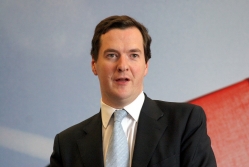 George Osborne has announced new fiscal rules to ensure that, in future, governments remain in budget surplus. However, not all business experts are convinced by his strategy.
George Osborne has announced new fiscal rules to ensure that, in future, governments remain in budget surplus. However, not all business experts are convinced by his strategy.
At his Mansion House speech this week, Osborne pledged to introduce a "new settlement" that will allow the Government to borrow only in exceptional circumstances so that successive governments run a budget surplus.
According to Treasury figures, governments have run a budget surplus in just seven of the past 50 years.
However, John Longworth, director general of the British Chambers of Commerce (BCC) has warned that the plan would put the UK into a "fiscal straitjacket".
"While running a budget surplus is a laudable aim, economic history shows that the national interest sometimes requires fiscal flexibility," Longworth said. "It is impossible to predict global economic conditions with any certainty, so no Government should put itself into a fiscal straitjacket that limits its scope to respond."
A recent paper by the International Monetary Fund (IMF) has also questioned the wisdom of paying down a deficit too quickly. It said that while Greece, Italy and Japan had a pressing need to reduce their debt ratios because of the risk of a financial shock, other countries such as Germany and the UK were in the "safe zone".
Jonathan Ostry, co-author of the report, said: "When a country runs a budget surplus to pay down its debt, there is no free lunch, the money has to come from somewhere. Either through higher taxes, which undercuts the productivity of labour and capital, or lower spending which, unless that spending is completely wasteful, has a similar effect."
The British Chambers of Commerce has warned against cutting infrastructure spending.
"Any move to constrain future spending should explicitly exclude infrastructure, which is an investment rather than just a cost," said John Longworth. "Roads, railways, energy grids and broadband drive productivity and job creation. Far too often, Britain's infrastructure needs have been sacrificed to short-term spending considerations. This must stop."
And, while the CBI welcomed Osborne's plan, director-general John Cridland said: "Underpinned by clear fiscal rules, we must get on top of the public finances in a way that is growth-friendly. The heavy lifting must come from savings to current spending so we need a step-change in the approach to public service reforms, while prioritising growth boosting spending, such as capital investment and innovation."
Image: Thanks to Altogether the Fool on Flickr.
